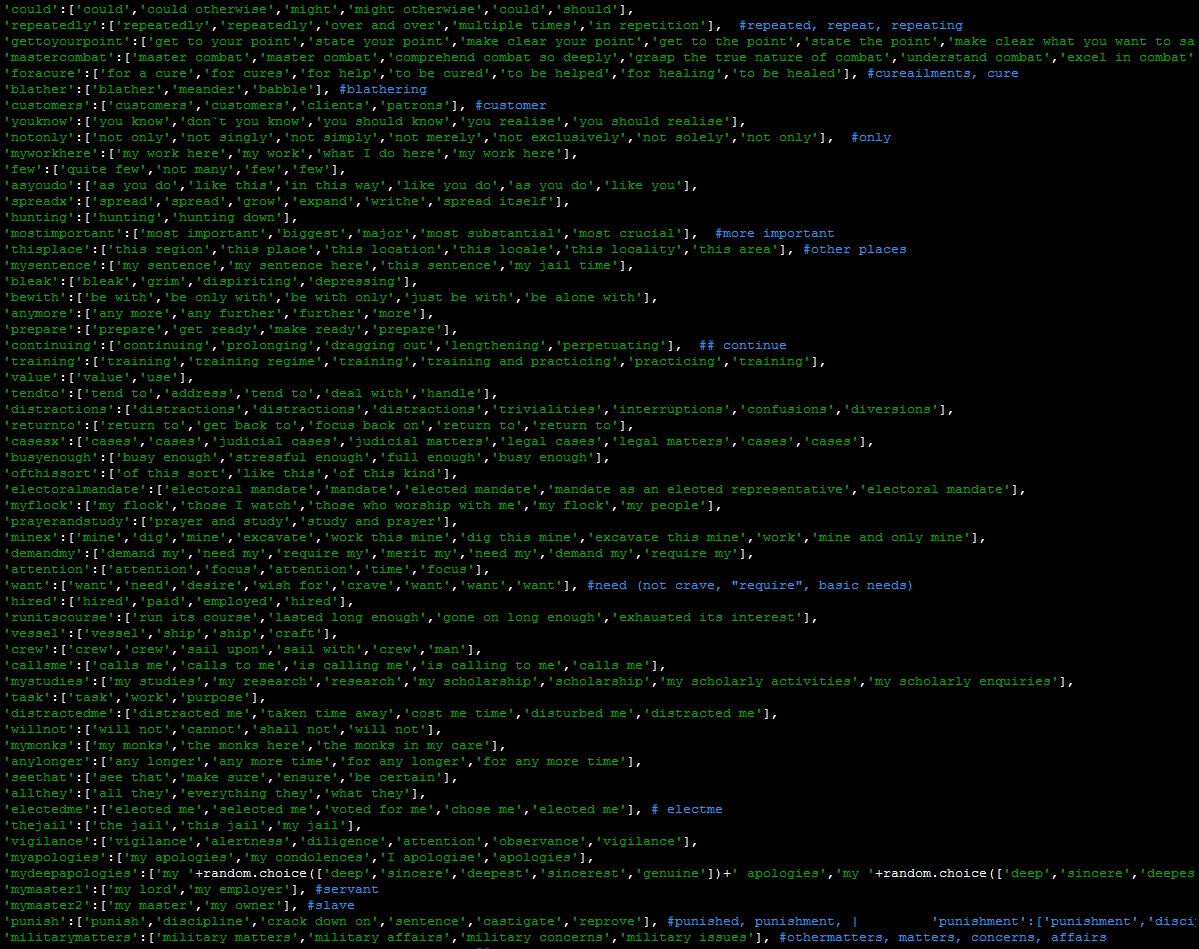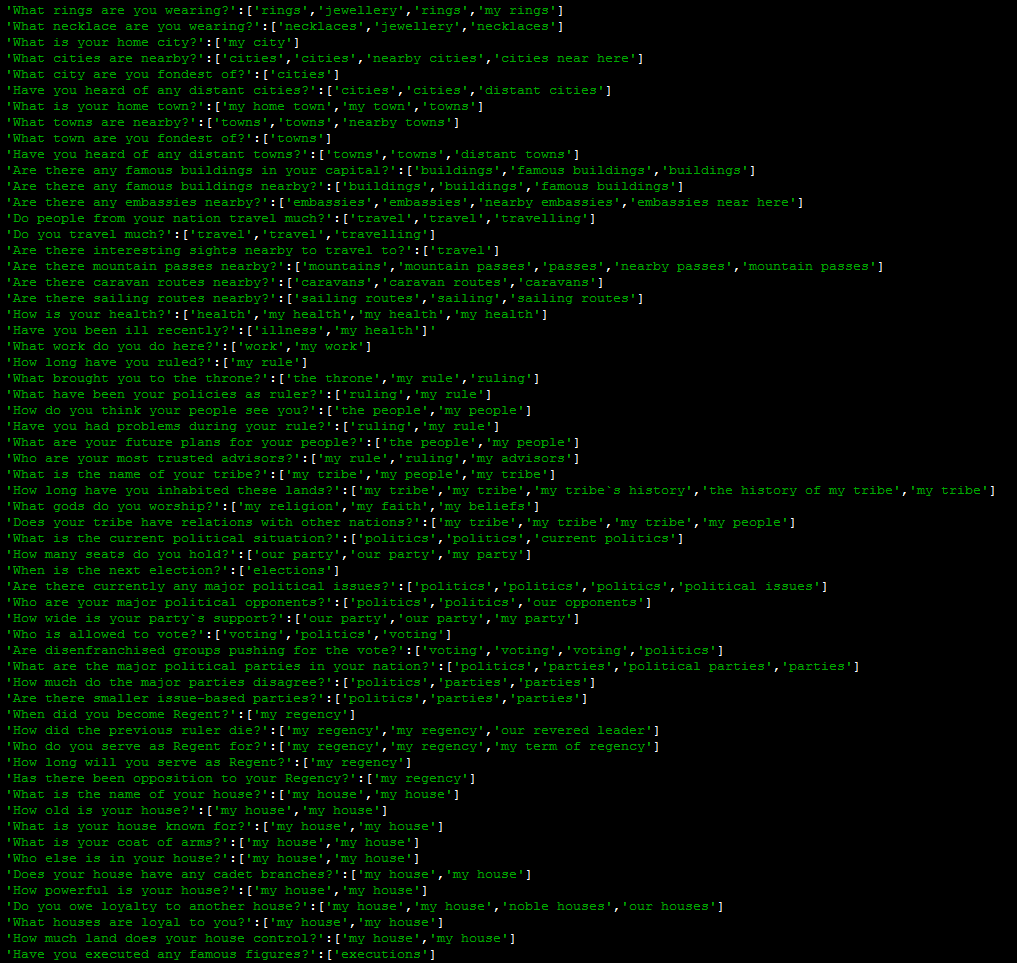Lots more progress this week! Still feels so great to be back into coding, and make solid and rapid progress on the conversation systems too; it's striking how much can be done in a day when one really focuses. In keeping with our new method of rapid blog-entry-writing which is something akin to a changelog, here we go:
- Finished off all the possible "annoyed responses", which fall into four categories, which I'm calling "general responses", "class responses", "default responses" and "special responses". When you ask someone the same thing twice or thrice, they give increasingly annoyed or puzzled responses; then, when you ask again, one of these comes into play. 50% of the time when you ask someone the same question over and over, they'll give a response similar to the responses they gave when you'd asked the same question twice or thrice, i.e. "why are you still asking me this?", which will sound more or less annoyed depending on their mood ("general").
- However, sometimes instead of a general response they will give a "class" response, which is a response tailored to their class. For instance, a ruler will specifically scold you for wasting their time; a torturer or a gladiator might make veiled threats about wasting their time; monks will express anxiety about the fact they aren't getting on with their studies; and so forth. These give a nice little bit of flavour; roughly half of all the NPC classes have "class responses" of this sort when you get on their nerves, but they don't always come into play. These will also later on appear when you ask irrelevant questions, as well repeated questions.
- Then, the other 50% of the time (when general/class responses are not triggered) the game will look to see if there is a special response for being annoyed about that particular topic, which might be annoyed after giving a positive response (the NPC answered you, yet you keep asking) or a negative response (the NPC didn't answer you, yet you keep asking). Some questions have special responses for positive/negative original answers, others just for one. If one exists, it then picks one; for instance, if you asked an inquisitor about heresy, and they didn't answer, and you repeatedly ask, they might say "At this point, I begin to find your fascination with heresy concerning...", or if you asked them about nearby volcanoes, and they answered, and you keep asking, they might give a snide response like "I've said all I can - these things are hard to miss". If a special response exists, it is chosen 75% of the time.
- Then, if there is no special response coded for the question and the specific positive/negative modifier in question, the game then goes for a "default response". If they responded positively, they might say something like "I've told you everything I know about [topic]", or if negatively, something like "I will not speak about [topic], can we move on?". The [topic] in this case will be drawn from a large library of phrases, like "buildings", "my health", "my homeland", "weapons", "fighting", "these tombs", "noble houses", or whatever makes sense for the topic.
- These also vary according to mood, so an NPC who still likes you after your constant questioning might say "What interests you so much about [x]" or "I've already told you about [x]", whereas an NPC annoyed with you will give sharper "Why do you persist in asking about [x]" or "I have got nothing more to say to you about [x]".
- What all of this means is that the responses of NPCs when you get on their nerves is tremendously varied according to their mood, their background, their NPC class, their origins, what you're asking about, how many times you've asked them, a wide range of other factors. It would take a tremendously long time for anyone to come close to seeing all the possible annoyed responses in the general/ class/ default/ special response categories.
- Some questions being asked repeatedly cause a bigger mood drop than others. For example, if you ask about sensitive topics, they get miffed much faster; if you ask about particularly mild topics, there is now a small chance they will not lose 1 mood; in general, though, asking a question twice will, 90% of the time, cause mood to drop by 1 (for those who don't recall, "mood" is on a nine-point scale, and if it drops to 2, there is a 33% chance they end the conversation; at 1 there is a 66% chance they end it; if it's at 1 and should drop again, they will always end the conversation).
- Also, asking people from more hostile or more closed nations the same question over and over comes with a die-roll for an extra mood drop alongside the default "1". What all of these points mean is that (in the extreme cases) asking someone from a friendly nation about a neutral topic will take a while to annoy them if you repeat the same query; asking someone from a much more hostile nation about their work as an inquisitor is going to tire them out extremely quickly; and all other interactions fall somewhere in the middle of that spectrum.
- Lastly, some NPC classes will always have their mood drop faster if you annoy them: this means rulers of various sorts, top-tier military officers, inquisitors, archivists... basically any high-rank NPC will get annoyed with you far more rapidly.
- I've also coded in what NPCs say when they want to leave a conversation with you; for now, this only happens if you ignore them. There are a wide range of default goodbyes that any class can potentially use, and some classes can only use because they don't have special goodbyes. Other classes do have special goodbyes, where they will explain that they need to go and do X, or talk to Y, or handle Z, or otherwise that your inane blather is generally less important to them than whatever else they might be doing. They then conclude with a "goodbye", "farewell", or similar.
- Note that these are very different from the goodbyes you get from NPCs if you say goodbye first and they echo the goodbye; they will give you at least a reasonably nice response back, even if their mood value is getting quite low. These goodbyes only happen if the NPC decides on their own account to end the conversation because whatever the player is saying is too annoying/irrelevant/distracting to continue the conversation.
- On some goodbyes where appropriate, NPCs might mention the time, e.g. "Good day to you" or "I bid you good night", etc, and the word used will be appropriate to the time of day, i.e. morning/day/evening/night.
- Also, of course, made sure illogical goodbyes cannot be said - for example, a prisoner will not say "I must attend to other matters now!" and then just go back to walking around their cell; whereas free NPCs might say that, a prisoner might instead say "This conversation has become too trying", or "Your tedious questions have become too much", or whatever.
- Added another 100 words/phrases that can be unpacked and spoken differently in each nation, and made sure they can conjugate all the other versions of the phrase sensibly; so "say" can be "say", "utter" or "speak", then "said" could be "said", "uttered", "spoke", and "saying" can be "saying", "uttering" or "speaking", and so on and so forth. Also added new conjugations of existing phrases or words which hadn't previously been put into the database.
Next week? I'll be playtesting all of this stuff, and once that's all working fine, working on some other aspect of conversations. As mentioned before, I am actually not trying to do everything needed for conversations per se for 0.8 - the "metaquestions" ("What do you think of [artwork]", etc) are being omitted until 0.9 at least, for example - but just enough to get the release off the ground and let people explore the central elements of the conversation system. As well as playtesting these elements, I want to start going through all the questions you can ask people, and check those work - I'm sure there are some bugs or typos in there I haven't spotted yet. I'm confident by the end of next week I can have all that done, after which I'll start working on having things like "[god]" or "[nation]" or "[house]" or "[officertitle]" or whatever correctly appear in speech. Those are a complex set of variables which will have to draw on a lot of different parts of the game, and I don't want to tackle that until everything here, and the standard Q&A, are all implemented. See you all next week!
Some of the new word variables/extensions, where the comments remind me which other conjugations also need to be covered:
The general words people will use when they ask things like "why are you still asking me about X":
As you can tell, a large part of this week has been writing massive lists! At least next week it'll be back to playing the game itself and seeing how things play, so hopefully some in-game screenshots will come your way next time...



Keepin' my fingers crossed for next week!
Can't wait to see some of this in action.
Thanks! This week's entry has turned out to be another screenshot-free entry, as I was feeling much more inclined to code than playtest, but *next* week will definitely be heavy on the screenshots :). I've now hit a point where I have to check everything is working before I move any further ahead :)